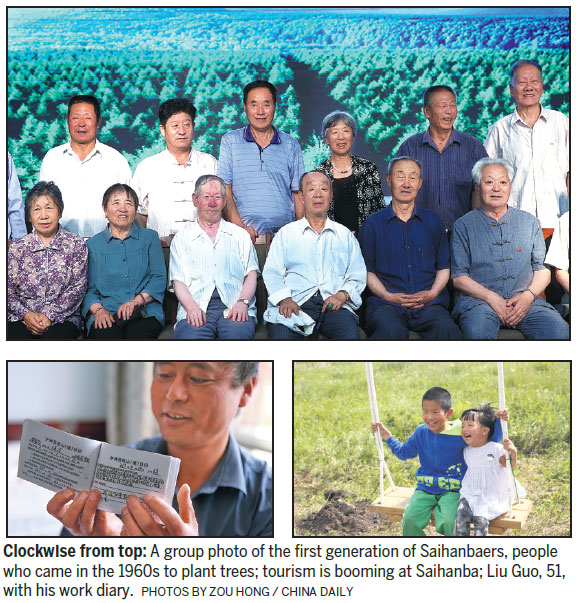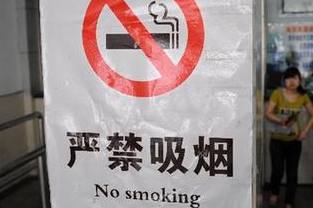Forest workers are a hardy breed

Six months ago, An Xulin moved from his home village to Saihanba National Forest Park 30 kilometers away. When I meet him, he is busy preparing cuts of beef to sell.
"When things are going well, I can sell 10 kilograms of these a day," he says. Every three kilograms of raw beef processed gives him one kilogram, which he sells for 240 yuan ($36; 31 euros; £28), which is not exactly cheap.
"You may think I'm raking it in, but people come here only between June and October. For the rest of the year we get almost no one. Most of the restaurants and small hotels you see along the road will then be closed."

That is because in Saihanba, winter lasts for six months, with the temperature dropping to as low as minus 43 C. The man-made forest in Hebei province bordering the Inner Mongolia autonomous region is the largest of its kind in China. Tourism booms in summer, and those who have grown up knowing little about this place apart from how cold it gets can then cash in on the opportunities.
Seasons of change
The scene offers a sharp contrast to what the area was like more than five decades ago, when the forest was nonexistent. Zhao Zhenyu, 76, who was at Saihanba in 1962, the forest's first year, knows all about it.
"That winter I was asked to drive some cattle from one part of the forest to another. Soon after I set out, snow started falling... and the wind was lashing hard in my face," Zhao says. "Believe it or not, I left at about 8 am and didn't reach my destination until about 10 am the next day. I thought I'd never make it." Zhao was among the 369 people who were there right from the start.
"At moments when it was too cold to walk I thought about abandoning the cattle, but I couldn't because that would have spelled certain death for them. If anything, living with the forbidding winters of Saihanba has made every one of us more respectful of life."
It was with such respect that Zhao and his forestry colleagues planted every tree, a devotion that has never waned.
"You can barely imagine the attention and care we give to each sapling," says Chen, the national forest's deputy director, who came to Saihanba in the 1990s.
"We put a thin layer of soil on top of certain types of saplings, a few millimeters thick. We wanted to protect the trees without limiting their growth."
In the forest, there is specially delineated ground for the cultivation of saplings. A little tree may be just 20 centimeters tall but be in its third or fourth year. Just as Beijing was not built in a day, it has taken three generations for the forest to become what it is now.
Changing of the guard
Most of those working there today belong either to the second or third generation. Liu Guo, 51, is a second-generation Saihanbaer who arrived 32 years ago, when he was 19. I meet him in the dormitory he shares with his workmate Li Feng, 60. The inside of the dormitory features two beds and little more, Spartan but clean. Hot water and electricity are provided, and in winter the big boiler ensures that hot water fills the entire heating system. Liu says he is more than satisfied.
No wonder. Just steps away from where he lives are the so-called second-and third-generation workers' dormitories. (The forest is so vast that it is divided into six areas, each with its own dormitory. Liu's lies somewhere in the north of the forest.)
"The first-generation building - if that's the right word for an improvised shelter propped up on tree trunks and covered with nothing but twigs and straw - was simply too fragile to survive," Liu says.
"Look at the row of chimneys on that rooftop," he says, pointing to the second-generation dormitory, built in the 1970s. "Tree branches were collected from the forest and burned, and that's how people managed to get through the long winters."
The third-generation dormitory was built in the 1990s, and the fourth, where Liu lives, in 2013.
Coal replaced wood as a fuel for fire in the early 1980s, and hot water on tap in the dormitory built in 2013 means workers can now take a shower whenever they want to.
"We used to go for weeks and sometimes even months without taking one," Liu says.
"The water in the mountain creeks is really cold, even in summer, and if you were to take a dip in one of those you can be sure you would come down with rheumatism, which happens to be the most common ailment here."
Life in isolation
Liu, like almost all of his workmates, is inured to hardship, to the point of stoicism, and he gives little away, even as I press him for details. But when a reporter with me asks about his daughter, the eyes of the stout 51-year-old water up and he begins to cry.
"I never got to spend time with her when she was little," he says, sobbing.
After talking to many people here, I realize that if there were a shred of consolation for Liu over his years of remorse for that forced neglect, it was thin indeed: knowing that many of his workmates were wracked with the same kind of guilt.
"In theory, we can go home to the town center not far away - by that I mean two hours by bus - once a week, but in reality, everyone must be here continuously for three months twice a year, during the spring and autumn fire seasons," Liu says.
"Spring used to be a big tree-planting season, and to some extent still is, but now there's little vacant land, so no one's going to leave, and in winter all roads down the mountain in effect are blocked by snow."
Changes have taken place since then, but not big enough to prevent Yu Lei, 36, from feeling the same as his parents did decades ago.
"I came - I should say 'came back' - to Saihanba in 2006, after graduating from the Beijing Institute of Technology, and have worked in the forestry's fire-monitoring center since then."
When Yu's grandfather came to Saihanba in 1962, his father was just 2.
"My father went on to work at Saihanba, and so did all my uncles. Altogether I have 14 relatives working here, me being the latest addition."
Yu married in 2008, and his wife now works at Saihanba, too. The couple have a daughter who is 8.
"A few weeks ago, when I last went home, my mother, who is now taking care of my daughter, told me that the girl got the correct answer to a very difficult math question, but no one else in her class did," he says.
"I asked how she did it, but she said she couldn't remember. ... I felt I was missing out on her growing up, just as my parents did, to their own regret."
Sadly, Yu has become an object of envy to many of his peers - children whose parents also once worked at Saihanba and whom Yu grew up with. "I wanted to come back and they welcomed me. This has not happened to everyone."
Chen, the deputy director, knows more about this.
"In 2014, we recruited 130 young people, of whom about 40 have already left," he says.
New challenges
As time passes and self-sacrifice and hardship become a work ethic that few people are willing to contemplate, Saihanba faces a new challenge.
"The overwhelming majority of our staff are either older than 45 or younger than 30," Chen says. "Those in the first group have spent their whole working life here - most being offspring of the first-generation Saihanbaers. But they will retire in 10 to 15 years.
"The second group consists of people recruited over the past few years. Although some have stayed long enough to start calling this place home, many more have wavered and left, unsure whether all the hard work and isolation are really what they want."
The way people are recruited has made things worse, Chen says.
"The rules call for all vacancies to be advertised, and there is open competition for them, mostly among university graduates. But most of the candidates, especially those from outside the province, know little about what the work entails, or they see it simply as a springboard to other opportunities. Many go on to do postgraduate study or take tests for government jobs after a year or two."
At the same time, children of the older generation of forest workers are shut out.
"That's because they don't have qualifications; most having grown up unattended by their parents," Chen says. "And the quality of education in this part of the province has certainly not been the best.
"But they love this place, which is their home. Of course, they need to study and improve themselves if they are to be up to the task. But if you have ever spent one winter here, you'll know that there's only one thing that can beat it, and that's love."
(China Daily Africa Weekly 08/25/2017 page16)
Today's Top News
- The farmer, the snake and Japan's memory hole
- Crossing a milestone in the journey called Sinology
- China-Russia media forum held in Beijing
- Where mobility will drive China and the West
- HK community strongly supports Lai's conviction
- Japan paying high price for PM's rhetoric






























